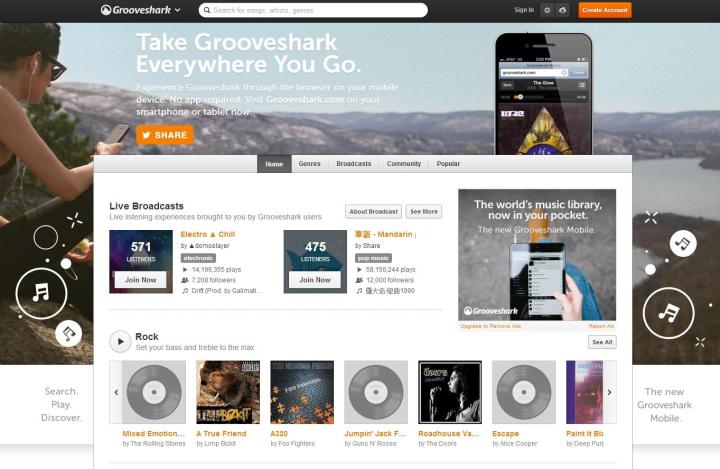
The service, tentatively named Broadcasts, is touted as the company’s first “compliant app.” It allows users to browse through user-created radio stations rather than having songs automatically picked for them, i.e. Pandora and others. The service won’t have commercials, but will offer a chat feature allowing users to text with each other while listening to music. The app is expected to launch on iOs and Android in January 2015.
Grooveshark has barely kept its head above water amid a seemingly endless inundation of lawsuits from the music industry since 2011. This past September, Judge Thomas Griesa of the U.S. district court in Manhattan ruled that Grooveshark and its parent company, Escape Media Group, are liable for copyright infringement connected to its employees illegally uploading copyrighted music as alleged by Universal Music Group. According to court documents, Grooveshark’s chief technology officer Joshua Greenberg sent an internal memo in 2007 instructing employees to “please share as much music as possible from outside the office” to help the service in its early days. This has created some bad blood between music labels and Grooveshark.
But unlike subscription music service such as Spotify, online radio services don’t have to make individual licensing deals with major labels, instead simply paying a government-regulated rate for online radio broadcasting rights. thanks to a government regulated consent decrees established in 1941, which act as blanket licenses for all the works they represent. If a service such as Pandora pays the consent decree for BMI and/or ASCAP, that service can then play any song that company represents. You can bet Grooveshark is looking to play that card.
Those consent decrees would be the central motivation behind a publisher pulling out of its deal with BMI (Broadcast Music, Inc), a performance rights organization which licenses songs from copyright holders it represents to services such as Pandora. But last December, Judge Louis L. Stanton ruled that record labels would have to withdraw both digital and performance rights from BMI and not simply the digital rights (as they wanted to do).
If a copyright holder withdraws from BMI, the organization would no longer be allowed to authorize the licensing of any works held by the copyrighter, and those services it had previously licensed works to would have to either remove them, strike a private deal with the copyright holder, or face copyright infringement. As a result, the major publishers struck deals with Pandora to indemnify the streaming radio service from potential copyright infringement lawsuit should they choose to opt out of BMI January 1, 2015. That’s great for Pandora, but does nothing for Grooveshark, which would have to go without a bunch of music to play, or cough up big bucks in a direct deal with publishers.
This could spell trouble for Grooveshark, as it may have a hard time securing licensing deals if a publisher such as Sony/ATV withdraws from BMI. In April 2012, Grooveshark discontinued its relationship with EMI after the publishing company sued Grooveshark for unpaid royalties. At the time, Grooveshark highlighted EMI’s “unsustainable streaming rates” as a reason for the end of their licensing agreement, suggesting Grooveshark has neither the funds nor the inclination to pay off labels to stock its service with music people actually want to listen to, cheap rates or not.


